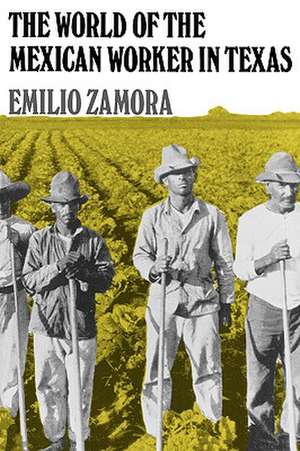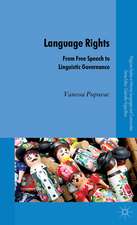The World of the Mexican Worker in Texas: Centennial Series of the Association of Former Students Texas A & M University (Paperback), cartea 44
Autor Emilio Zamoraen Limba Engleză Paperback – 30 iun 1995
Din seria Centennial Series of the Association of Former Students Texas A & M University (Paperback)
-
 Preț: 159.66 lei
Preț: 159.66 lei -
 Preț: 104.22 lei
Preț: 104.22 lei -
 Preț: 131.17 lei
Preț: 131.17 lei -
 Preț: 230.13 lei
Preț: 230.13 lei -
 Preț: 103.02 lei
Preț: 103.02 lei -
 Preț: 252.99 lei
Preț: 252.99 lei -
 Preț: 118.89 lei
Preț: 118.89 lei -
 Preț: 103.40 lei
Preț: 103.40 lei -
 Preț: 292.29 lei
Preț: 292.29 lei -
 Preț: 127.90 lei
Preț: 127.90 lei -
 Preț: 202.47 lei
Preț: 202.47 lei -
 Preț: 108.24 lei
Preț: 108.24 lei -
 Preț: 163.58 lei
Preț: 163.58 lei -
 Preț: 120.53 lei
Preț: 120.53 lei -
 Preț: 207.51 lei
Preț: 207.51 lei -
 Preț: 166.48 lei
Preț: 166.48 lei -
 Preț: 223.27 lei
Preț: 223.27 lei -
 Preț: 141.50 lei
Preț: 141.50 lei -
 Preț: 153.65 lei
Preț: 153.65 lei -
 Preț: 119.00 lei
Preț: 119.00 lei -
 Preț: 163.58 lei
Preț: 163.58 lei -
 Preț: 153.63 lei
Preț: 153.63 lei -
 Preț: 138.62 lei
Preț: 138.62 lei -
 Preț: 102.77 lei
Preț: 102.77 lei -
 Preț: 239.93 lei
Preț: 239.93 lei -
 Preț: 203.02 lei
Preț: 203.02 lei -
 Preț: 132.12 lei
Preț: 132.12 lei -
 Preț: 154.51 lei
Preț: 154.51 lei -
 Preț: 93.99 lei
Preț: 93.99 lei -
 Preț: 177.27 lei
Preț: 177.27 lei -
 Preț: 142.44 lei
Preț: 142.44 lei -
 Preț: 143.41 lei
Preț: 143.41 lei -
 Preț: 356.90 lei
Preț: 356.90 lei -
 Preț: 147.88 lei
Preț: 147.88 lei -
 Preț: 167.79 lei
Preț: 167.79 lei -
 Preț: 209.40 lei
Preț: 209.40 lei -
 Preț: 209.01 lei
Preț: 209.01 lei -
 Preț: 165.80 lei
Preț: 165.80 lei -
 Preț: 154.32 lei
Preț: 154.32 lei -
 Preț: 343.19 lei
Preț: 343.19 lei -
 Preț: 143.03 lei
Preț: 143.03 lei -
 Preț: 165.04 lei
Preț: 165.04 lei -
 Preț: 399.36 lei
Preț: 399.36 lei -
 Preț: 125.36 lei
Preț: 125.36 lei -
 Preț: 140.41 lei
Preț: 140.41 lei -
 Preț: 75.01 lei
Preț: 75.01 lei -
 Preț: 77.93 lei
Preț: 77.93 lei - 11%
 Preț: 197.89 lei
Preț: 197.89 lei
Preț: 143.59 lei
Nou
Puncte Express: 215
Preț estimativ în valută:
27.48€ • 28.76$ • 22.73£
27.48€ • 28.76$ • 22.73£
Carte tipărită la comandă
Livrare economică 07-21 aprilie
Preluare comenzi: 021 569.72.76
Specificații
ISBN-13: 9780890966785
ISBN-10: 0890966788
Pagini: 300
Dimensiuni: 153 x 231 x 19 mm
Greutate: 0.44 kg
Editura: Texas A&M University Press
Seria Centennial Series of the Association of Former Students Texas A & M University (Paperback)
ISBN-10: 0890966788
Pagini: 300
Dimensiuni: 153 x 231 x 19 mm
Greutate: 0.44 kg
Editura: Texas A&M University Press
Seria Centennial Series of the Association of Former Students Texas A & M University (Paperback)
Textul de pe ultima copertă
The twentieth century brought industrialization to Texas cities. For Mexican workers in the state, this meant worsening economic conditions, widespread discrimination, and an indifferent or at times hostile Anglo labor movement. Faced with such challenges, Mexicans often looked to each other or toward Mexico for support and inspiration in building a largely autonomous, occasionally trans-border labor movement. In this first book-length examination of the earliest organized efforts by Mexican-origin workers in Texas, Emilio Zamora challenges the usual, stereotypical depiction of Mexican workers as passive and hard to organize. Instead, working within the framework of the "new labor history", he looks beyond the conventional focus on trade unionism and collective bargaining to encompass the broader social experiences and culture of Mexicans as a national minority and a repressed segment of the working class. Through extensive use of Spanish-language archives in Mexico and the United States, Zamora examines workers' independent organizations - including mutual aid societies and cooperatives that functioned as unions - as well as spontaneous informal actions, including strikes, by Texas Mexican workers. He portrays the gradual yet increasing integration of those organizations into the mainstream labor movement and examines labor solidarity across ethnic lines. In addition, he discusses the special role Mexican labor played in bridging labor struggles across the international border and in challenging racial exclusion on the job in the predominantly Anglo labor federations and in the broader institutional life of South Texas. Although the early efforts at inter-ethnic unity failed tomaterialize fully, Zamora concludes, they nevertheless provided a legacy that tells much about the minority position of the Mexican community, the impressive organizing activity and bid for incorporation of Mexican workers, and the ambivalent response by organized and unorganized Anglo workers.















